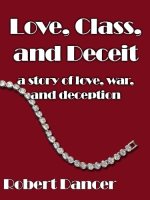Title: Love, Class, and Deceit
Author: Robert Dancer
Publisher: Amazon Digital Services
ISBN: 9780615554440
Pages: 338, Kindle Edition
Genre: Romance/Fiction
Reviewed by: Jason Lulos, Pacific Book Review
Book Review
Robert Dancer’s Love, Class, and Deceit is a vignette of a love story set during World War II and reads as if it were indeed written during this time. The nostalgic reader will find the stylistic straightforwardness and directly defined characters charming and inviting. Dancer’s narrative is well-written and uncomplicated. While some readers may find the flat characters and linear plot too convenient, others will find these traits genuine and embrace this tale for its simplicity and restraint of verbose description. The setting and social class of people are somewhat reminiscent of Gatsby’s parties, but this is not a tale with that kind of psychological depth or profound character exposition. The narrator is unobtrusive; this is Realism in the literary sense.As a strictly Realist/Naturalist narrative, there is no deep introspection into psychological conflicts. There are events, dialogue and only an occasional invitation to a character’s consciousness. The rest is left to the reader’s imagination. Depending on your taste, this is part of its minimalist charm or a problem of the lack of deep description. In both of these senses, either as compliment or criticism, Love, Class and Deceit comes across like a storyline from one of the quaint films of the tail end of Hollywood’s Golden Age. In fact, the third person narration paints a point-of-view not unlike such a film, and this underscores the novel’s honesty and lack of pretense.
Andrew Bolton comes from an aristocratic family whose heritage, as part of the conservative owning class, reaches back to pre-Civil War. Andrew, a self-evident liberal relative to his patrician peers, emerges as the quiet hero. Andrew’s subtle leftist leanings are enough to contrast him to those around him; namely, his father, best friend Peter Bates. There is less of this contrast between Andrew and the love of his life, Natalie Rowlands. Andrew’s experiences in the war confirm his belief in embracing America’s roots as an immigrant nation; the multicultural band of brothers he shares the battlefield become a model for what he sees as the country’s migrant past and more settled yet more diverse future. While on leave, Andrew meets Natalie via their mutual friend Peter. Andrew and Natalie quickly fall in love and this is what sustains his optimism when he returns to Europe and the war. To risk a spoiler, I will only say that this optimism is the crux of the story’s deceitful turn.
Initially, only Andrew and Natalie are willing to think beyond the traditions of their patrician families and the societal pressures placed upon them. The class implications are only a soft undercurrent. This is a love story, quaintly, pure and simple.


